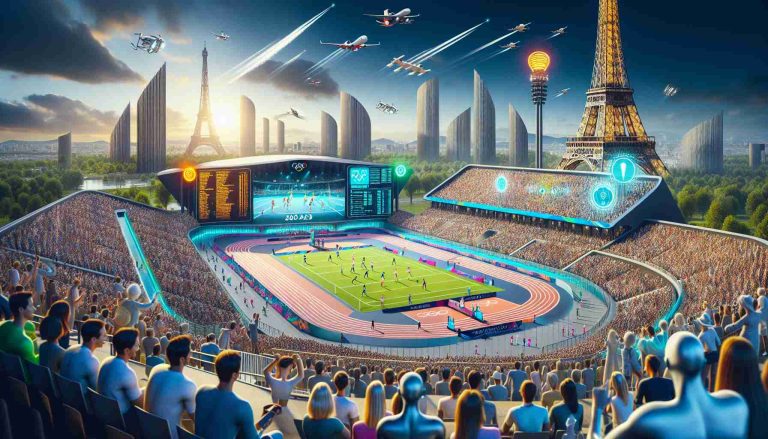As the Official Global AI Platform Partner For the upcoming Paris 2024 Olympic and Paralympic Games, Intel announced its commitment to delivering an advanced audiovisual engagement experience. Using Intel processors, the company aims to introduce the power of artificial intelligence (AI) in new and innovative ways, poised to redefine the way fans, athletes, organizers and viewers interact with most great sporting scene in the world.
Innovative AI applications in the spotlight
Intel’s strategies focus on immersive experiences that promise to revolutionize the understanding and potential of Olympic athletes through intelligent technology. Additionally, the Paris 2024 Olympic Games will mark a milestone as the first event to offer 8K live broadcasts, delivering an exceptionally high resolution viewing experience to audiences around the world. Improving the accessibility of Paralympic venues will also be at the forefront, improving the experience for people with disabilities.
A representative from Intel’s Olympic and Paralympic Games office expressed the tech giant’s intention to leverage AI to create deeply engaging and interactive experiences. Paris 2024 is expected to be one of the biggest events ever held in France, with the participation of nearly 15,000 athletes, millions of spectators and billions of people around the world via traditional television and digital platforms.
Interactive AI installations and cutting-edge broadcasts
At the event, AI-based installations will invite participants on an exciting journey in the shoes of Olympic athletes. These AI platforms, trained on Intel® Gaudi® accelerators and running on Intel® Xeon® processors with built-in AI acceleration, will enable advanced vision analytics to match participants with an Olympic sports profile .
Additionally, Intel is delivering groundbreaking advancements in accessibility for visually impaired people. Using AI, three-dimensional models of the U.S. team’s high-performance center in Paris and the International Paralympic Committee headquarters in Bonn will offer voice navigation guided by a smartphone app.
A revolutionary 8K live streaming experience powered by Intel Xeon processors will reduce internet latency, improving the overall viewing experience. Additionally, broadcasters will, for the first time, be able to use AI-driven automation to deliver personalized digital content faster than ever, including instant distribution of specialty trailers.
Olympic Legacy and Intel’s Technology Partnership
Intel has a history of enhancing the Olympic experience with 5G, virtual reality, drones and AI platforms. A notable highlight is the unveiling of Intel® Shooting Star™ drones at the PyeongChang 2018 Winter Olympics. The tech giant’s partnership has continually advanced technology in sports, with shared goals of creating a better world thanks to sporting excellence.
The Paris 2024 Olympic Games will begin on July 26 and end on August 11, while the Paralympic Games will be scheduled from August 28 to September 8. With AI at its helm, Paris 2024 promises to be an unforgettable fusion of sport and technology.
Current AI and Sports Market Trends
There is a growing trend to leverage AI in sports to improve performance analysis, audience engagement and event management. With the increased availability of data from sensors, wearables, and video analytics, the sports industry is turning to AI to learn insights and improve experiences. AI-based content personalization, predictive analytics for athlete performance and injury prevention, as well as dynamic ticket pricing are other emerging trends.
Forecasts for AI technology in the sports sector
The use of AI in sports is expected to see significant growth in the coming years. This growth will be fueled by advances in machine learning algorithms, the proliferation of wearable technology, and an increased emphasis on data-driven decision-making within sports organizations. Sports-related AI technologies are generating new revenue opportunities, particularly in the areas of marketing, fan engagement and performance analytics.
Main challenges and controversies
Challenges to implementing AI include concerns about data privacy, cybersecurity and the potential loss of jobs due to automation. Additionally, the use of AI has raised fears about the fairness and transparency of decision-making, for example when AI contributes to adjudication of decisions. These controversies may create opposition to AI technology from different stakeholders, believing that it affects the integrity of sport.
Benefits of AI innovations at the Paris 2024 Olympic Games
AI technology can provide many benefits, including:
– Enhanced visual experiences with high-resolution technology and personalized content.
– Enhanced performance tracking and analysis for athletes and coaches.
– Increased engagement by creating immersive and interactive experiences for fans.
– Increased accessibility for people with disabilities, leveraging AI for navigation and information consumption.
Disadvantages of AI innovations at the Paris 2024 Olympic Games
However, with these innovations, several disadvantages may arise:
– High costs associated with deploying advanced technologies.
– Potential privacy concerns, as AI systems may require the processing of sensitive personal data.
– Dependence on technology can lead to vulnerability; any malfunction or cyberattack could disrupt the games.
– The digital divide could worsen if technology is not accessible to all spectators.
For updates and additional information on the subject, you can visit the official website of the Paris 2024 Olympic Games via the following link: Paris 2024 official website.
For more information on Intel technologies and their other initiatives, their main domain provides access to the latest developments: Intel official website.


